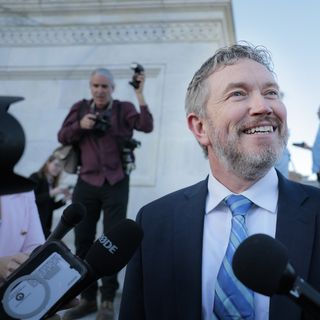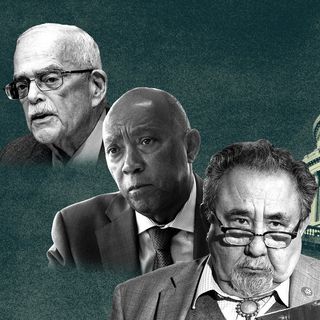Blue Origin's next crew includes entrepreneurs and founders. Here's who's following Katy Perry and Lauren Sánchez into space.
Blue Origin
- Blue Origin announced new crewmembers for its next space mission, NS-32.
- It will be the first mission since its April mission, which sent Katy Perry and Lauren Sánchez into space.
- This crew includes business figures, entrepreneurs, and space enthusiasts.
Jeff Bezos's Blue Origin has announced the crew for its next space mission, which includes business leaders, space enthusiasts, and entrepreneurs.
It's a very different lineup from the crew on the previous mission, which included Katy Perry and Lauren Sánchez.
This is who is going on Blue Origin's 32nd flight for an 11-minute journey into space. The launch date is yet to be announced.
Blue Origin
Mark Rocket
Mark Rocket is an entrepreneur and the CEO of Kea Aerospace, a company that sends remotely piloted aircraft into the stratosphere to collect aerial imagery and data.
In 2007, he was a seed investor of Rocket Lab — an aerospace manufacturer and launch service provider — where he served as a co-director up until 2011, per his personal website.
The company also sends high-altitude balloons to test communications, thermal modeling, and navigation.
Rocket changed his surname to match his passion, per 1News. The trip will make him the first New Zealander in space.
Jesse Williams
Jesse Williams, a Canadian entrepreneur, is the CEO of Car History Group — a company that provides public information about vehicles to prospective buyers.
He claims on his LinkedIn profile to have launched his first business at the age of 15 and that his other ventures include eDirect, WuYi Tea, Dazzle White, and Penguin Leads.
Paul Jeris
Paul Jeris, whose father was a NASA engineer, is a real estate businessman, entrepreneur, and world traveler who has visited more than 149 countries, per Blue Origin.
In an interview after the news, he told Fox 8 News that he was "so excited" when he received the call.
He said he was inspired from a young age as he watched historic launches such as Apollo and Viking.
Amette Medina Jorge
Amette Medina Jorge, a STEM teacher at Odyssey Academy in Galveston, Texas, has led more than 60 experiments focusing on space and zero gravity and performed in-flight 3D printing as part of a parabolic Zero-G flight.
In 2013, she received the AIAA and Challenger Center Trailblazing STEM Educator Award, which celebrates those who inspire the next generation of STEM innovators.
Jamie Alemán
Jamie Alemán is a Panamanian attorney and a senior partner at the law firm Alemán, Cordero, Galindo & Lee, which he set up.
He was Panama's ambassador to the US from 2009 to 2011 and was also the country's minister of government and justice in 1988.
Blue Origin said he would be the first person to go to space who has visited all 193 countries recognized by the United Nations, as well as the North and South Poles.
Gretchen Green
Gretchen Green is a radiologist who also serves on the US Space and Rocket Center Education Foundation Board. The Rocket Center cites Gretchen as a four-time Space Camp program alumna.
She set up her company, The Expert Resource, which connects medical expert witnesses with attorneys.
She was one of the first teenagers to bicycle across the US from East to West, per her company's website.







